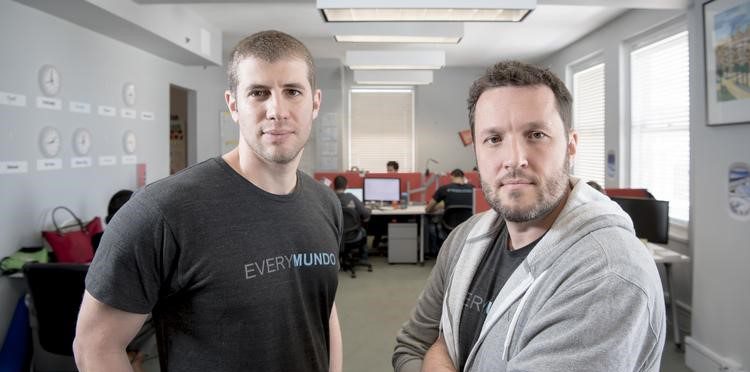This homegrown company, bootstrapped until its exit, open-sourced its operations frameworks for the community.
By Nancy Dahlberg
For startups, a strong operational strategy is always smart but as we enter a period when growth at all costs doesn’t work and a path to profitability becomes a priority, it’s critical.
The founders of the homegrown EveryMundo, a pioneering leader in fare marketing technology for airlines, grew the company to 150 employees and served over 80 airlines at the time of their successful exit last year – without raising outside capital. But over the years they spent a lot of time learning – the hard way – what works and what doesn’t operationally.
EveryMundo was acquired last year by the publicly held PROS. But prior to that, as founders Seth Cassel and Anton Diego were considering private equity for the first time and ultimately were in talks about the acquisition, they found themselves trying to express to potential investors and acquirers what makes EveryMundo work – their operations framework that has worked so well for them. So they packaged all the strategies together for the interested parties and as they’ve shared it with other founders in their networks, they’ve learned EveryMundo is fairly advanced given their size. Their peers were often at the stage of developing their teams and trying to figure out how to align everybody, figuring out titles, setting goals, etc.
“I think because we were bootstrapped, we had to spend a lot of time being very effective with the resources we had, and it kind of pushed us in that direction earlier than most companies,” Cassel says.
EveryMundo decided to open-source their operational frameworks, allowing other startups to leverage the learnings, and in turn, contribute to it and make it better. They call it Ops in a Box.
“We feel like this is a legitimate, meaningful contribution to the community to help them be better companies,” says Cassel. “Let’s all remember, it’s hard to grow a company. We’d love for Ops in a Box to help more companies have success and keep growing, doing whatever it is they want to do in pursuit of their visions.”
They’re living, breathing frameworks – even today EveryMundo still reviews their frameworks a couple of times a year and may make tweaks. EveryMundo’s five frameworks are:
- The 36Y: Aligned goals and results EveryMundo intends to achieve in 1 year’s time;
- Job Banding: Aligned individual roles and responsibilities in pursuit of those goals;
- The Employee Bill of Rights: Aligned managerial accountability for individual development;
- The Values & Actions: Aligned company values and individual behavioral norms;
- The Feedback & Alignment Program: A program to check ourselves against all of the above.
All five frameworks work together to move the company forward, and it’s all about alignment and accountability. Cassel is most proud of the 36Y and Employee Bill of Rights.
The 36Y is EveryMundo’s goal-setting and alignment structure. Company goals are determined by leadership and reflect its ambitions as a company. EveryMundo has six and then each quarter there are three-month goals for each one of Y (for year) goals. Departments identify departmental contributions to the company goals – the “Department 36Y” – and then there are individual goals nested under those, again aligned with the company goals. The framework also includes how EveryMundo tracks goals.
It’s all about alignment, which creates a sense of purpose for even the smallest tasks, says Cassel, an Endeavor Entrepreneur. “They can say this little thing I’m doing today at work I can trace all the way back to one of the annual goals of the whole company. And when we figured that out, that’s when it got super powerful because it’s about getting everyone rowing in same direction. That’s when you really start to see the whole is greater than the sum of the parts. It’s also been huge for us in making sure that we’re being judicious with resources and never straying too far from aligned pursuit of certain initiatives and goals in the company.”
The Employee Bill of Rights, which EveryMundo calls internally the Mundo Bill of Rights, arose from the founders’ struggle to answer the question, what does it mean to be a manager? Every time they tried to define it, it was a very different answer depending on the department, Cassel says. So they flipped the question to: what does it mean to be managed? “Then you start to have an incredibly universal definition because if you work at a company, the company is taking on a responsibility toward you and the responsibility is manifested through the manager.”
The Employee Bill of Rights defines how managers stay accountable for their team members. The 8 employee rights support individual engagement and career advancement and apply to all managers – no matter their department.
“This has allowed us not only to tell the manager, hey, you manage this person, this is what you owe them and this is what you’re accountable for, but on top of that it’s allowed us to devote the right resources to managerial development. It created consistency among all of the teams around what to expect from their managers,” Cassel says.
After that, they have developed other frameworks around alignment of individuals to roles and creating values that are truly actionable and have the same meaning to everyone as well as the all-important feedback loop.
EveryMundo figured all this out the hard way and hopes that other startups will use the framework as a starting point and take it in the direction that works for them, making it a better version of itself for them. And now that the market is starting to demand profitability as opposed to growth at all costs, this all becomes more important. How will companies make the shift? “Well, we have to think about our structure, we have to think about how we manage, we have to think about what goals we’re going to pursue as a company and how we align efficiently behind that. We have to make sure we’re operating like a well-oiled machine together. The frameworks help us do that,” says Cassel. “As originally a bootstrapped business, we’ve always operated that way. We know no other way.”
Check out Ops in a Box here and let the founders know what you think.
READ MORE ON REFRESH MIAMI:
- Homegrown EveryMundo acquired in $90M deal by publicly traded PROS
- South Florida is a hotbed for climate tech innovation. Here are 5 reasons why
- Under Miami Angels’ new leadership, expect more membership growth and another record year for investments
- Alteon is building the infrastructure to power the creator economy
Follow @ndahlberg on Twitter and email her at [email protected]
- Human ingenuity, inspiration, a call to action: Miami Tech Talent Coalition takes the stage at eMerge Americas - April 24, 2024
- Miami Tech Month, where developers get their own conference, VCs take the stage, and anything is POSSIBLE - April 23, 2024
- Full circle moment for Johanna Mikkola, the new CEO for Tech Equity Miami - April 22, 2024





